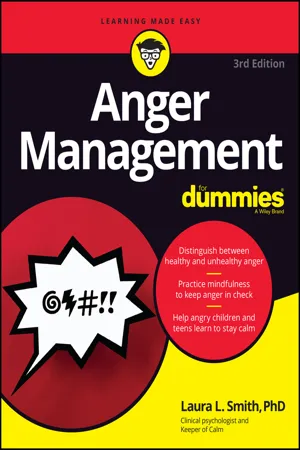
- English
- ePUB (mobile friendly)
- Available on iOS & Android
Anger Management For Dummies
About this book
Learn to mitigateyour angerand take charge of your life
Everyone experiences anger from time to time, but when left unchecked or unbridled, this normal human emotion can becomedisruptiveanddamagerelationships. Ifyou're ready to stop lettingangercontrol your life, turn to Anger ManagementForDummies. Thistrusted sourcegivesyoutoolsto identify the source ofyouranger—whether it's fear, depression, anxiety, or stress—andoffers ways todeal with the "flight or fight"instinctthat anger produces, allowing you torelease yourselfand your lifefrom itsgrip.
Anger ManagementForDummies outlinesspecific anger management methods, skills, and exercisesthat you can use to take control of yourfeelings and actions.It provides:
- Information on the different kinds of rage, includingroad, air, andoffice
- A look atIntermittent Explosive Disorder(IED)and how tomanageaggression
- Advice onhow to deal with angry childrenandteens
- Details onhow anger is related to the "fight, flight, or freeze" response of thenervous system and prepares you to fight (for good or bad)
Overcoming anger issues requires support, mindfulness, and a bit of practice—all of which this book provides.When you're ready toface your triggers andchange your perspective on the emotions of anger or rage, let Anger ManagementForDummies give youthehelping handyouneed.
Tools to learn more effectively

Saving Books

Keyword Search

Annotating Text

Listen to it instead
Information
Getting Started with Anger Management
Understanding Anger




Defining Anger
Choosing Anger
- You might say that Mike is a born pessimist, but actually that’s not true. Human beings aren’t born with attitudes; those attitudes come from life experience. What is true is that Mike is the product of an alcoholic home, where things could be going well one minute and fall into complete chaos the next. He found out as a child not to expect the good times to last and that he and the rest of his family were always just one beer away from a family crisis.
- So for all his adult life, Mike has expected that most things will eventually turn out badly, given enough time. No matter how loving his wife is or how cooperative his children are, in the back of his mind he harbors this expectation that any minute things will change for the worse, and he’s ready to react in anger when that moment comes. Why will he get angry? It’s Mike’s way of defending himself against chaos, a way of feeling in control, which is a response that's different from when he was a child, hiding under the bed while his alcoholic father ranted and raved well into the night.
- Mike is unaware of how his early childhood influenced his view of the world. Like most children of alcoholics, he figures that because he survived those unpleasant years (physically at least), he’s okay. He also has no clue why he loses his temper so easily.
Dispelling Common Anger Myths
- If you don’t express anger, you just might explode. The truth is, the more often you express anger, the more likely you will feel angry in the future. On the other hand, appropriately, carefully expressed anger can help you. So keep reading!
- Males are angrier than females. If by angrier you mean how often people experience anger, it’s simply not true that men are angrier than women. Surveys show that women get mad about as frequently as men. Men and women may express anger a little differently, but research has been inconsistent on that issue.
- Anger is bad. Anger serves a variety of positive purposes when it comes to coping with stress. When controlled, it can energize you, improve your communication with other people, and defend you against fear and insecurity.
- Anger is good. When it leads to domestic violence, property damage, sexual abuse, drug addiction, ulcers, and self-mutilation, anger is definitely not good.
- Anger is only a problem when you openly express it. Many angry people either suppress their anger (“I don’t want to talk about it!”) or repress their anger (“I’m not angry at all — really!”). People who express their anger are the squeaky wheels who get everyone’s attention; people who repress or suppress their anger need anger management just as much (see Chapter 3 for more information about the costs of anger).
- The older you get, the more irritable you are. It’s the other way around: As people age, they report fewer negative emotions and ...
Table of contents
- Cover
- Title Page
- Table of Contents
- Introduction
- Part 1: Getting Started with Anger Management
- Part 2: Rethinking Anger
- Part 3: Equipping Yourself with Anger Management Tools
- Part 4: Managing Anger Hotspots
- Part 5: Handling Anger from the Past
- Part 6: Living Beyond Anger
- Part 7: The Part of Tens
- Index
- About the Author
- Connect with Dummies
- End User License Agreement
Frequently asked questions
- Essential is ideal for learners and professionals who enjoy exploring a wide range of subjects. Access the Essential Library with 800,000+ trusted titles and best-sellers across business, personal growth, and the humanities. Includes unlimited reading time and Standard Read Aloud voice.
- Complete: Perfect for advanced learners and researchers needing full, unrestricted access. Unlock 1.4M+ books across hundreds of subjects, including academic and specialized titles. The Complete Plan also includes advanced features like Premium Read Aloud and Research Assistant.
Please note we cannot support devices running on iOS 13 and Android 7 or earlier. Learn more about using the app

